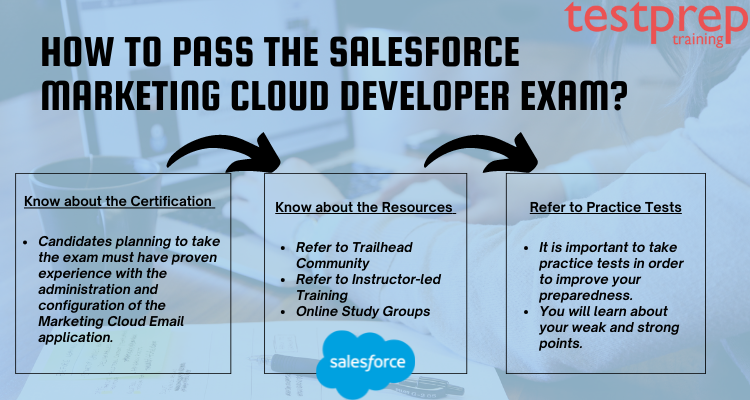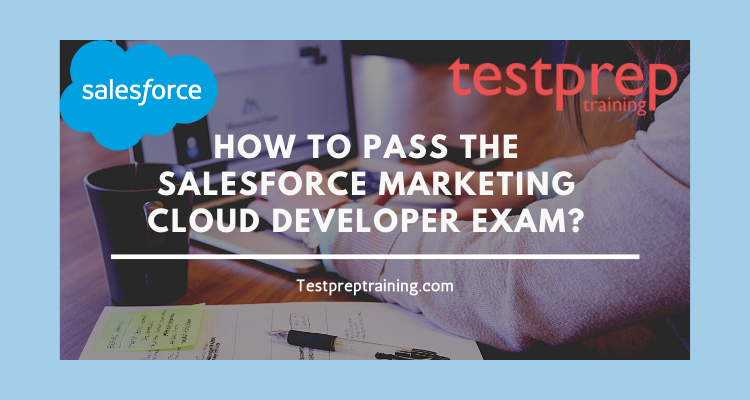The Salesforce Marketing Cloud Developer exam is designed for individuals who have experience with Salesforce Marketing Cloud development. It tests the candidate’s knowledge of Marketing Cloud APIs, scripting languages such as AMPscript and Server-Side JavaScript, and the use of development tools such as the Marketing Cloud API Explorer and the Marketing Cloud Code Editor.
So, it is crucial that you thoroughly comprehend a variety of speech and telephony-related technologies while studying for this test. Some of the key learning skills to develop before preparing for the exam include –
- You should also gain adequate hands-on experience with the platform, scripting, and debugging.
- Also, it is suggested to develop dynamic, personalized marketing assets like emails, landing pages, and building forms using HTML, CSS, and AMPscript.
- It is also important to develop competency in SQL and have sufficient experience working with Marketing Cloud APIs.
Let us now look at some of the important details of the Certified Salesforce Marketing Cloud Developer exam.
About Salesforce Marketing Cloud Developer Exam
The Salesforce Marketing Cloud Developer program is for developers with prior Marketing Cloud development experience. As evidenced by passing the Salesforce Certified Marketing Cloud Email Specialist certification, the audience has proven experience with the administration and configuration of the Marketing Cloud Email application.
This certificate is for a Marketing Cloud Developer who has experience with HTML, CSS, and AMPscript to create dynamic, personalized marketing assets like emails, landing pages, and forms. Salesforce Certified Marketing Cloud Developers are also SQL experts and have worked with Marketing Cloud APIs.
Audience Description: Salesforce Marketing Cloud Developer
Salesforce Marketing Cloud Developers are familiar with configuring and customizing data in Salesforce Marketing Cloud. The developer is well-versed in subscriber management across channels and can troubleshoot a variety of programmed languages used in the creation of tactical and strategic email campaigns.
The Salesforce Marketing Cloud Developer has worked as a full-stack developer for Marketing Cloud, producing tailored, dynamic messages and landing pages, as well as working with data configuration, manipulations, and advanced segmentation, as well as reporting and analytics. Salesforce Marketing Cloud Developers typically have at least one year of experience developing for Marketing Cloud and related tools.
Knowledge required:
- The Salesforce Marketing Cloud Developer candidate possesses the knowledge, skills, and abilities to: Set up and configure data models (data extensions, shared data extensions, Contact model).
- Set up the data import.
- Work with clients and data from the platform (SQL, views, Send Log). Basic SQL, including join statements, should be written.
- Using several scripting languages, create dynamic, customized marketing assets.
- Create an online experience for Marketing Cloud (data forms, custom preference pages).
- Explain how to manage subscriptions.
- Using the REST and SOAP API, work through and resolve scenarios.
- Spend time studying the resources indicated in this Exam Guide as well as the additional Salesforce-provided study tools.
Salesforce Marketing Cloud Developer Exam Format
The exam format for the Salesforce Marketing Cloud Developer exam is summarized in a table below followed by a brief description of the same –
- To begin, the test is called Salesforce Marketing Cloud Developer, and it does not have a specific code. There are a total of 60 questions on this exam.
- Case studies, short answers, multiple-choice, mark review, drag and drop, and other types of questions may appear in the Salesforce Marketing Cloud Developer Exam.
- Following that, the candidates will be able to take the exam in English.
- Furthermore, you must pass this exam in 105 minutes, which should not be a difficult challenge if you know how to manage your time well. In addition, a minimum score of 63 percent is required to pass the exam.
Exam Policies
Let us look at some basic details of the exam like pricing and scoring policy etc. let’s have a look:
Pricing Policy
The registration fee for the Salesforce Marketing Cloud Developer exam is USD 200 plus relevant taxes. However, the charge may vary depending on the region, and taxes are also subject to change.
Exam Scoring
The Salesforce Marketing Cloud Developer exam has a passing score of 63 percent, which is quite achievable. Because the questions are in MCQ format, you must be very clear and direct in your responses. This is possible if you have excellent study materials.
Retake Policy
Half as much is charged to retake the Salesforce Marketing Cloud For Developers exam as it is to take it the first time. Thus, the fee for retaking the test is $100. Salesforce updates all certification tests three times a year in line with its release cycles (Winter, Spring, and Summer). Throughout each release cycle, you get three chances to take the same certification test (i.e., Salesforce Certified Administrator). All efforts will be restarted when the next release cycle begins. The same test can thus be taken three times during a single release cycle.
Registration Policy
You can book your exam through Kryterion global testing solution. Create your Webassessor account on the official Salesforce website. Then you’re ready for the exam.
Let’s take a look at the process of passing the Salesforce Marketing Cloud Developer Exam.
How to pass the Salesforce Marketing Cloud Developer Exam?
For aspiring network engineers, the Salesforce Marketing-Cloud-Developer test is critical to obtaining Salesforce certification. All of the Salesforce Marketing-Cloud-Developer examinations are quite thorough and cover a wide range of technological topics. This exam is a requirement for the Salesforce Marketer certification(s) and is an important step in honing your skills. Let us look at steps that will help you in passing this exam –

Step 1 – Learn about the exam objectives
Data Modeling: 14%
- Configure account Contact model in Marketing Cloud.
- Given a scenario, differentiate the various types and uses of data extensions in the Marketing Cloud.
- Describe how Contact Records relate across channels.
- Explain the Contact Delete process.
Salesforce Documentation: Data Modeling
Programmatic Languages: 35%
- Given a scenario, demonstrate knowledge of AMPscript and SSJS language syntax and functions.
- Implement standard development best practices using Marketing Cloud programming languages.
- Describe how Marketing Cloud handles AMPscript processing.
- Given a customer scenario, determine how to programmatically exclude a subscriber at email send time.
Salesforce Documentation: Marketing Cloud Programmatic Languages
API: 22%
- Given a scenario, describe API objects, methods, and routes.
- Describe the OAuth authentication flow and how an access token is used in SOAP and REST headers.
- Given a scenario, evaluate the significance of response handling.
Salesforce Documentation: Manage API Access
Data Management: 22%
- Configure import activity using various file formats within Marketing Cloud.
- Given a scenario, apply SQL to produce the desired results.
- Given a scenario, explain the different ways to extract data from Marketing Cloud.
- Describe SQL best practices for managing data in Marketing Cloud.
- Given a scenario, apply best practices for send logs.
- Given a scenario, describe how data is affected by the Contact delete process.
Salesforce Documentation: Data Management
Security: 7%
- Identify different options to secure data in Marketing Cloud.
- Describe security best practices in Marketing Cloud.
Salesforce Documentation: Salesforce Security Basics
To have detailed information about the course outline, visit the online tutorials for Salesforce Marketing Cloud Developer Exam by Testpreptraining.com!
Step 2: Get Familiar with the basic Terms
Here are some terms that are important to know for the Salesforce Marketing Cloud Developer exam:
- Marketing Cloud APIs: A set of REST and SOAP APIs that allow developers to integrate Marketing Cloud with other systems.
- AMPscript: A scripting language used to personalize and customize email content and landing pages in Marketing Cloud.
- Server-Side JavaScript: A scripting language used to automate and customize Marketing Cloud features.
- Marketing Cloud Code Editor: An integrated development environment (IDE) that provides a code editor, syntax highlighting, and debugging tools for Marketing Cloud development.
- Marketing Cloud API Explorer: A tool that allows developers to explore and test Marketing Cloud APIs.
- Data Extensions: A table-like structure used to store data in Marketing Cloud.
- Journey Builder: A tool that allows marketers to create and manage customer journeys in Marketing Cloud.
- Email Studio: A tool that allows marketers to create and manage email campaigns in Marketing Cloud.
- Mobile Studio: A tool that allows marketers to create and manage mobile campaigns in Marketing Cloud.
- Marketing Cloud Connect: A tool that allows Salesforce CRM and Marketing Cloud to be integrated, enabling marketers to use customer data from both systems.
Step 3 – Refer to Recommended Training and References
Salesforce recommends a mix of hands-on experience, training course completion, Trailhead trials, and self-study in the topics indicated in the Exam Outline part of this exam guide as preparation for this exam. The following are some of the self-study materials that are recommended for this exam:
To continue honing your Salesforce skills, enroll in expert-led courses at Trailhead Academy. Search for the topics listed in the Exam Outline section of this guide and study the information related to those topics in online Documentation, Tip Sheets, and User Guides. Salesforce Help also provides access to documentation, tip sheets, and user guides.
Step 4 – Refer to Additional Resources
Online Tutorials – Referring to Online Tutorials are the finest technique to improve your knowledge. These tutorials provide you with a thorough knowledge of the exam’s concepts. As a result, your preparedness will be strengthened.
Practice tests – Analyzing your preparations is a critical step in your journey. Furthermore, this can only be accomplished by self-evaluating your performance. Taking the Salesforce Marketing Cloud Developer Practice Exam is essential for validating your knowledge and identifying areas for improvement. Furthermore, You can hone your accuracy and speed. Taking multiple practice tests will also boost your confidence. Attempt to outperform yourself with each successive test to pass this exam. Begin practicing right away!
Step 5 – Take the Exam
By practicing and referring to appropriate resources, you are now all set to take the exam. Remember to be patient and calm while attempting the exam. When it comes to preparing for the exam, the importance of time management cannot be overstated. As a result, we recommend that you study Salesforce Certified Marketing Cloud Developer regularly. Ideally, you should study at the same time every day. Make sure there are no distractions when you are studying.
Step 6 – Maintaining your Credential
One of the advantages of having a Salesforce credential is that you’ll always be informed about new product releases (updates). As a result, you’ll have to go through the Marketing Cloud developer certification maintenance modules on Trailhead once a year. Also, Don’t let your hard-won certification expire! Your accreditation will expire if you do not complete all maintenance obligations by the due date.
Expert Corner
This exam will put your knowledge to the test in real-world circumstances. Most test-takers learn the vocabulary since it is so extensive in order to pass the exam. Also, reading frequently can help you understand subjects and apply lessons to real-world problems. Moreover, The Salesforce exam is a hands-on exam that will evaluate your understanding of the theories and ideas associated with becoming a Salesforce Certified Marketing Cloud Developer in a practical environment. The majority of individuals try to memorize the many terms in the domain in order to ace the exam. You must, however, develop a deeper understanding of them.




